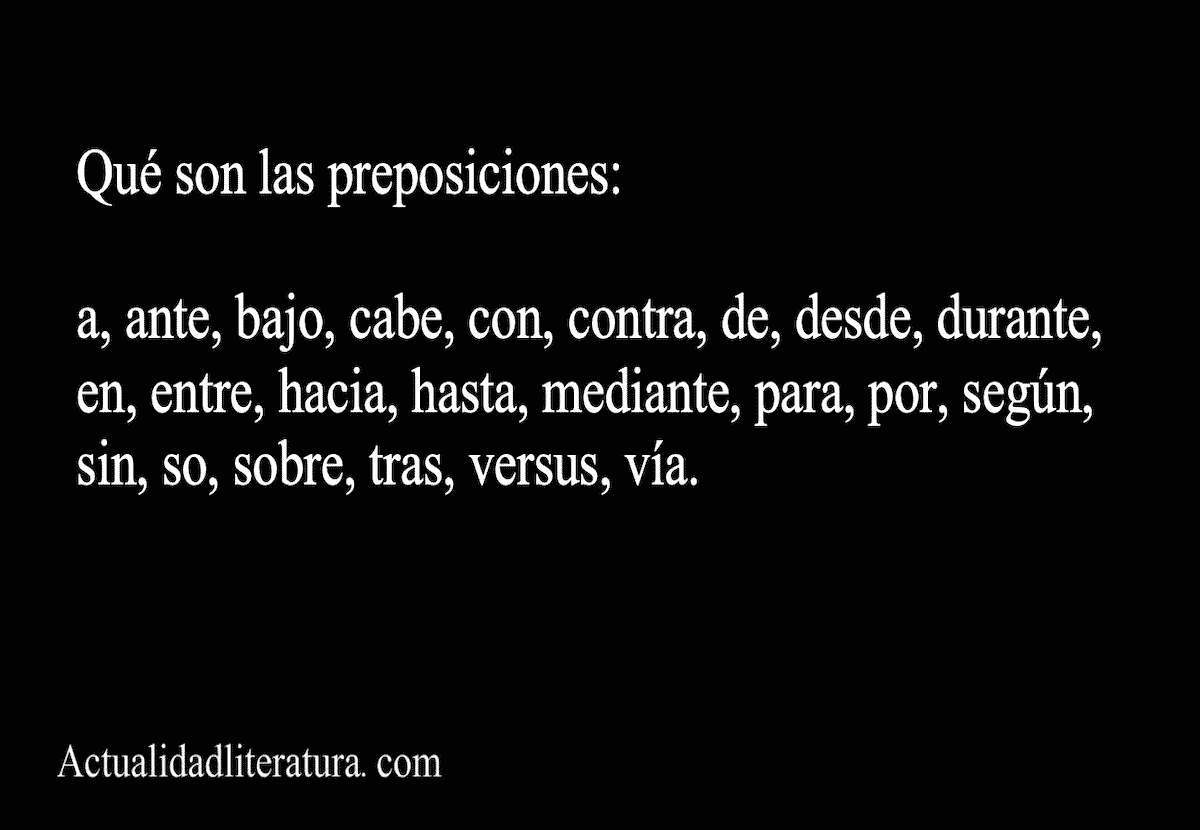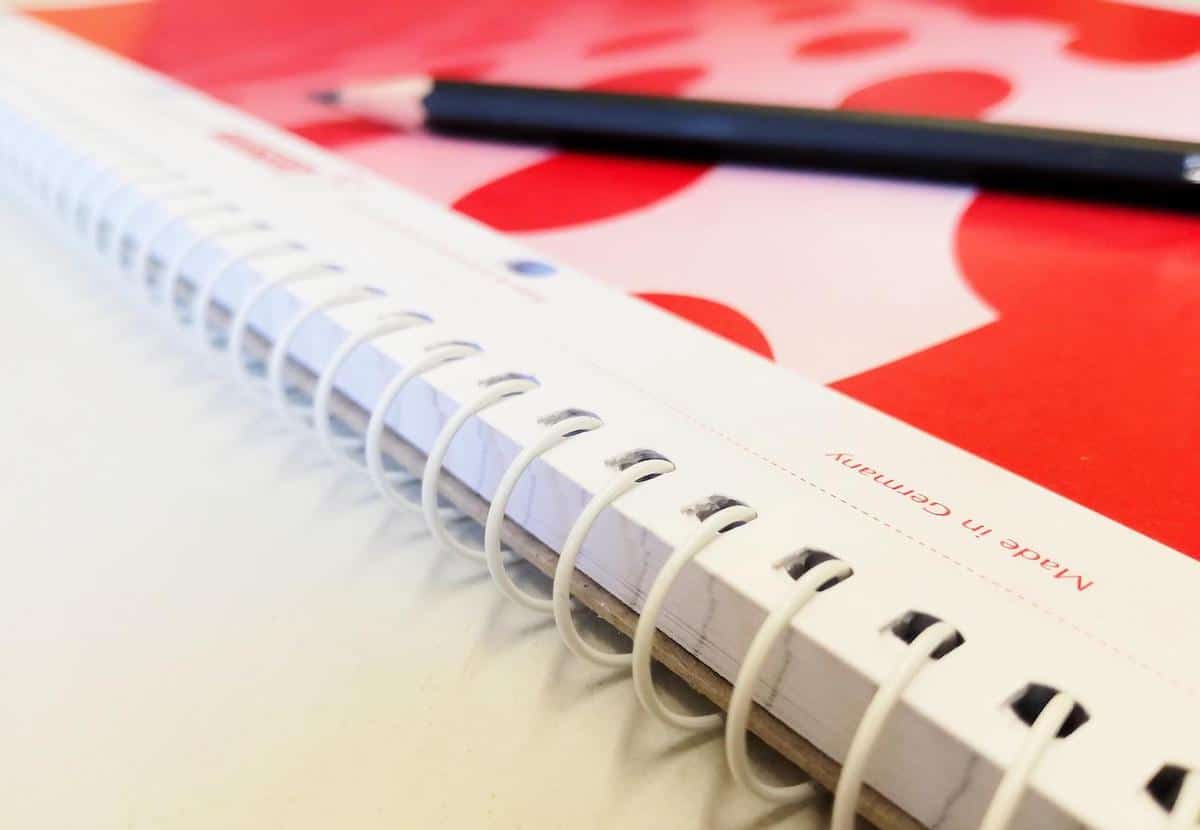
Prepositions help us to order our ideas in a text in a cohesive way. It is a grammatical term that can be very useful in writing any text. We must know them to know that we use them properly. Not by knowing how to speak a language we can deduce if we do it correctly or not.
But far from making a tedious article on this subject, Here we will give you examples of the use of prepositions in Spanish. Remember that prepositions are that list of words that we all learned by heart at school. This will surely make it easier to remember them.
What are the prepositions
Prepositions are grammatical categories or classes of words that serve to unite phrases (usually nominal) or sentences.. A phrase is a structure of words, whose main category is called the nucleus and has a syntactic function within a sentence. For example: a noun phrase is: "[the dog] barks" ([the dog] definite article + noun or noun).
Moreover, An example of a prepositional phrase is «My sister likes chocolate»; the structure introduced by a preposition [To my sister] is a prepositional phrase and in this case it does house a noun phrase [my sister]. Another example: "The murderer was arrested by the police" [prepositional phrase: by the police].
However, prepositions in the Spanish language very commonly introduce sentences. Examples: "The girl I told you about the other day works at the municipal swimming pool" [prepositional phrases: the one I told you about / at the municipal swimming pool] / "Life in the town is better than I remembered" [phrase prepositional: of what he remembered].

Features
The prepositions in Spanish are: to, before, under, fits, with, against, from, during, in, between, towards, until, through, for, according to, without, so, on, after, versus and via.
Some of them have fallen into disuse. We can find them in some classic works, or in legal texts. It should means "next to" (The farmhouse is be the river) and so "bass". We will rarely use "fits" or hear it from someone else, but "so" is still common in legal or procedural language and, therefore, in the media: "The two women cannot return to their country so death penalty". For its part, "versus" is an anglicism that should only be used at specific times (sports competitions or games): "In today's game they face Real Madrid versus Atletico Madrid".
The prepositions have invariable form (they never change), that's why they don't have gender or number and its function is relationship between words, phrases and sentences, as we have already seen. They can be contracted in this way: a + el (al) and de + el (del).
Normally we use prepositions to express movement, place and time. It is the most common: I have gone to Florence this vacation (movement), I live in Madrid (place), The concert starts at nine (time).
We can also find prepositional adverbs. An adverb is a modifier of the verb and prepositions can also frequently complement a verb. That is why we can find adverbs with the appearance of a preposition, especially to determine the location of something. These are the most common hybrid prepositional adverbs: over/up, under/down, front/front, back/back, inside/in, outside/out, front.
Likewise, There are more constructions that include prepositions and are called prepositional phrases., but also textual connectors: because of, in order to, by force of, in spite of, about, about, next to, around, before, in relation to, facing, before, after, as for, in order to, in the midst of, instead of, because of, regarding…

Uses and examples
A
Usage: way (I write a machine because I like it), movement (I travel a lot a Toledo because I work there), parts of the day (They come to check the boiler a midday), direct object of person (I see a the neighbor every morning), edad (I got married a age 25), exact time / time (The class is a eight), expression of place / distance / day / temperature / frequency (The bathroom is al background / is a 200 km / We are a Tuesday / We are a 20th / I exercise twice a week), indirect compliment (A my family likes the sea), Time (open from 9 a 8) space (From Madrid a Alicante is almost 500 km).
Ante
Usage: against (The kids are doors the director / Maria crashes doors problems)
Bass
Usage: place (The bike is with the tree).
With
Usage: instrument (I make all the calls with my cellphone), company (Live with my boyfriend).
Contra
Usage: opposition / shock (It is not right that Mariana acted against his brother).
De
Usage: possession (This book is de Manuel), material (The table is de wood), Time (The library is open de 9 to 8), the origin / origin (I go out de home every morning / Hans is de Germany), name complement (bag de fruit / book de math), portion (Do you want some de cake?), cause (He died de cancer), space (De Madrid to Alicante is almost 500 km / I'm going to turn off the television de this room), part of the day in relation to an hour (It's 5 de the afternoon).
From
Usage: place (From the balcony I can not see the pharmacy), tiempo (I don't see my brothers from Christmas), start of a temporary action (Worked from March to October).
During
Usage: temporary extension (Dolores did not smoke anything during the pregnancy).
En
Usage: place (We rested en Majorca / The bed is en the bedroom / The letters are en the table / the socks are en the washing-machine), tiempo (we will fly en June to Malaga / I do my homework en 30 minutes).
Between
Usage: temporary relationships (Between September and November the trees are beautiful), personal (Between Rosa and Julián are going to drive me crazy), of objects (I am undecided between the red and the blue clock).
To
Usage: address (We have to go to Salamanca), approximate time (I've been with Marta to six o'clock).
Until
Usage: endpoint of an action temporary or not / place (I have been working since March but also October / I will work but also six o'clock / We ate but also get fed up / I will walk but also the park and I'll go home).
Through
Usage: through / with (I did the paperwork through electronic certificate).
For
Usage: purpose (I exercise for get fit), recipient (This dress is for Sarah), period of time (I need to finish this for morning), address (I go for Girona at the weekend), opinion (For me that they will not come to the wedding).
By
Usage: cause (I study German by worked), parts of the day (Worked by the afternoons), tiempo / approximate place (I will go to Madrid by November / I like to walk by the beach), through (He left by the main door), frequency (I give guitar lessons three times by week), planet (I sail by Internet), substitution (he changed his car by the motorcycle), agreement / disagreement (By me not to come).
According to
Usage: way (I'm going to do it According to tell me).
Shipping Costs
Usage: Lack of (Usually as pipes without Salt).
About
Usage: place (The camera is about bed), approach (we have stayed about nine o'clock), referencia / about (I love to talk about cinema).
Tras
Usage: behind (The river is after that mountain).
Via
Usage: through (We send the documentation by fax / We will arrive in Alicante by Albacete).
Very interesting article. As always by dint of using them all day and without realizing it we use them in a defective way. And when we misuse language our thinking is fatally impoverished. Thank you for this simple and essential article.
Hello Fernando! Thank you very much for your comment. This is always the case with issues related to the language that we all use but that few know. It is worth thinking about it a bit.